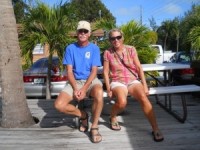
s/v Ceili
"You live with a ship a few years and cuss her enough and all of a sudden one day you wake up and discover you're in love." ----Ernest K. Gann, CMA 1930 and Author of "Twilight For The Gods" and Captain of the brigantine ALBATROS
13 May 2012
09 April 2012
02 April 2012
26 March 2012
18 March 2012 | Vero Beach
12 March 2012 | Green Turtle Cay, Abacos, Bahamas
20 February 2012 | Sea of Abaco
20 February 2012
15 February 2012
03 February 2012 | Marsh Harbour
01 January 2012 | Marsh Harbour, Abacos
24 December 2011
23 December 2011
22 December 2011
22 December 2011
18 December 2011
17 December 2011
17 December 2011
13 December 2011
08 December 2011 | West End, Bahamas
Surviving Off The Grid
23 December 2011
Bill

Forget Kilowatts....How About Amp Hours?
One of our biggest concerns while cruising has been energy management. Before leaving on this trip, we tried to anticipate our energy needs by upgrading our electrical system, anticipating that we would have little opportunity to plug into shore power, and would need to rely mostly on self generated power.
We installed a house bank of 6 AGM batteries, totalling 600 amp/hours. A balmar 100 amp high output alternator on the engine, managed by a ARS 5 smart regulator provides primary battery charging. This is augmented by solar panels (130 watts) and an Air-x marine wind generator. We also installed a Magnum 2000 watt inverter/100 amp charger to provide AC power and to charge batteries if needed from a portable Yamaha 2000 watt generator.
Our biggest energy consumers are our refrigeration (about 80 Ah/day) and our inverter, which suprisingly consumes about the same energy as the refrigerator, if left on continuously. We have learned to shut off the inverter when not in use, to eliminte this power hog. When motoring on the ICW, our alternator was able to keep us fully charged. When anchored, though, we can sit only 2-3 days before needing to recharge. Solar and wind power are not sufficient to supply our needs for longer periods. In this case, we can recharge using the Yamaha generator feeding the charger in 2-3 hours, rather than running the main engine.
In retrospect, more solar panels(maybe doulbling what we now have) would be the answer, especially in the southern latitudes. Finding a place to put them, though, is another matter. Solar, one installed, is low maintenace and less prone to failure than the other systems, as we have discovered.
As we were leaving RI, our alternator began to put excessive voltage into the batteries, and this was traced to a bad regulator, which was replaced (lesson: travel with a backup alternator and regulator). Last week, as we were motoring to Man O' War Cay, we noticed an electrical burning smell in the engine compartment, as we were charging our deeply discharged house bank underway. Unsure of the cause, and anxious to prevent a fire, we pulled the fuse on the alternator, effectively shutting it down for the remainder of the trip. Once anchored, we removed the alternator and inspected it and the wiring. A loose connection where the alternator output feeds the battery main had resulted in shorting and some insulation burning. Vibration from the engine had likely caused this, and now we will pay more attention to these high amperage connections.
One of our biggest concerns while cruising has been energy management. Before leaving on this trip, we tried to anticipate our energy needs by upgrading our electrical system, anticipating that we would have little opportunity to plug into shore power, and would need to rely mostly on self generated power.
We installed a house bank of 6 AGM batteries, totalling 600 amp/hours. A balmar 100 amp high output alternator on the engine, managed by a ARS 5 smart regulator provides primary battery charging. This is augmented by solar panels (130 watts) and an Air-x marine wind generator. We also installed a Magnum 2000 watt inverter/100 amp charger to provide AC power and to charge batteries if needed from a portable Yamaha 2000 watt generator.
Our biggest energy consumers are our refrigeration (about 80 Ah/day) and our inverter, which suprisingly consumes about the same energy as the refrigerator, if left on continuously. We have learned to shut off the inverter when not in use, to eliminte this power hog. When motoring on the ICW, our alternator was able to keep us fully charged. When anchored, though, we can sit only 2-3 days before needing to recharge. Solar and wind power are not sufficient to supply our needs for longer periods. In this case, we can recharge using the Yamaha generator feeding the charger in 2-3 hours, rather than running the main engine.
In retrospect, more solar panels(maybe doulbling what we now have) would be the answer, especially in the southern latitudes. Finding a place to put them, though, is another matter. Solar, one installed, is low maintenace and less prone to failure than the other systems, as we have discovered.
As we were leaving RI, our alternator began to put excessive voltage into the batteries, and this was traced to a bad regulator, which was replaced (lesson: travel with a backup alternator and regulator). Last week, as we were motoring to Man O' War Cay, we noticed an electrical burning smell in the engine compartment, as we were charging our deeply discharged house bank underway. Unsure of the cause, and anxious to prevent a fire, we pulled the fuse on the alternator, effectively shutting it down for the remainder of the trip. Once anchored, we removed the alternator and inspected it and the wiring. A loose connection where the alternator output feeds the battery main had resulted in shorting and some insulation burning. Vibration from the engine had likely caused this, and now we will pay more attention to these high amperage connections.
Comments
| Vessel Name: | CEILI |
| Vessel Make/Model: | Island Packet 40 (hull #50) |
| Hailing Port: | Providence, RI |
| Crew: | Bill and Linda Daley |
| About: | Currently sailing the coast of New England in anticipation of heading South someday. Ceili is currently moored in East Greenwich, R.I. We have been sailing for awhile now, and are both USCG licensed captains (hence, no crew!) |
| Extra: | "Ceili" (kay'- lee) is gaelic for "joyful celebration." It reflects our Irish roots. |
Gallery not available
s/v CEILI

Who: Bill and Linda Daley
Port: Providence, RI
Table of Contents
Interesting Links
- Bahamian Chicken Souse
- Aldrich Mansion
- Amokura
- AtLantic Highlands Harbor
- Baltimore Promenade
- Block Island
- C and D Canal
- Capt. Billy Joel Designer Man
- CEILI on YouTube
- Coecles Harbor Marina
- Concordia Yawls/Padanaram
- Coronet/IYRS
- Current NY weather RADAR
- Current Wind Observations
- Cuttyhunk
- Cuttyhunk Fishing Club Slide Show
- Dark 'n Stormy Redux
- Dunkirk's Heroes Return
- Dutch Harbor
- Father's Day Rescue
- Fishers Island
- GAM Single Sideband Antenna
- Glebe Creek Screenworks
- Goslings Rum
- Greatland Laser Flare
- Island Packet 40 Specs
- Island Packet Photos
- Island Packet Yachts
- Katama Breach
- Lopolight
- Maine harbors
- Marine Traffic/AIS
- Masquerade Sailblog
- McMurdo FastFind PLB
- Montauk
- National Hurricane Center
- New Bedford YC/Padanaram
- Newport
- Ocean Marine Systems
- OUR BOAT PROJECTS
- Pangaea Expedition
- Queens's Wave
- Rapid Diver
- S/V ONWARD
- Safety at Sea Seminar
- Scott Boomlock
- Seven Drowned in Tarpaulin Cove
- Shelter Island
- Sleighride
- Star Island Marina-Montauk
- Stonington,CT
- Sydney Boats Ablaze
- THE BEST Ginger Beer
- The Greatest Great White
- WebCam: Edgartown Marine
- WebCam:Block Island
- WebCam:Cape Cod Canal
- WebCam:Hyannis Harbor
- WebCam:Newport
- YANMAR Help!!!